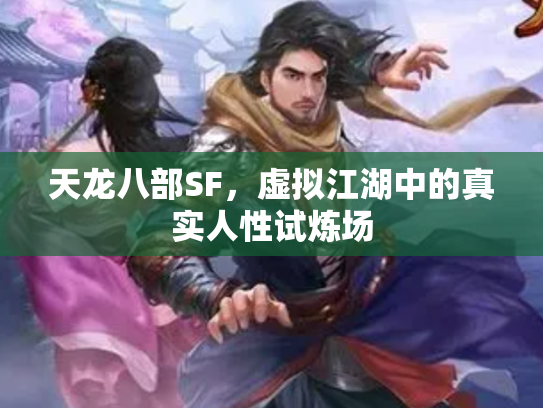天龙八部SF,虚拟江湖中的真实人性试炼场
- 2025-08-28
- 2
在数字时代的浪潮中,游戏已不再是简单的娱乐工具,而是演变成了一个复杂的文化现象和社会缩影。《天龙八部》作为中国武侠网游的经典之作,其官方服务器(官服)承载了无数玩家的江湖梦。 alongside it, a parallel world has emerged—the private servers of "天龙八部"(简称"天龙八部SF"),这些非官方的服务器, often operating in legal gray areas, have become a unique social laboratory where human nature is tested, desires are amplified, and the boundaries between virtual and real blur. 这篇文章将深入探讨天龙八部SF背后的现象,分析其吸引力、 ethical dilemmas, and the profound insights it offers into contemporary society.

天龙八部SF的存在,首先源于玩家对官服 limitations 的不满,官方服务器往往受制于严格的规则、缓慢的升级进程和高昂的消费门槛,在官服中,玩家可能需要花费数月甚至数年才能达到顶级等级, or acquire rare items through costly in-game purchases. In contrast, 天龙八部SF typically offers accelerated leveling, free premium items, and customized content, creating an illusion of instant gratification. This "fast-food" style gaming experience caters to the modern desire for quick success, mirroring societal trends where patience is scarce and immediacy is prized. 关键词"天龙八部SF" here represents not just a technical alternative, but a rebellion against the established order—a digital utopia where players can bypass the grind and immerse themselves in a power fantasy.
这片"自由"的江湖并非没有代价,天龙八部SF的运营 often lacks the stability and security of official servers. Data loss, sudden shutdowns, and security breaches are common risks, leaving players vulnerable. Moreover, these servers exist in a legal gray area; they infringe on intellectual property rights, leading to potential legal actions. This precarious existence mirrors broader societal issues: the trade-off between freedom and security, the allure of shortcuts, and the ethical compromises we make in pursuit of desires. In天龙八部SF, players might gain virtual power quickly, but at the risk of losing it all overnight—a stark reminder of the fragility of ill-gotten gains in both digital and real worlds.
Beyond the surface-level attractions, 天龙八部SF serves as a mirror reflecting human nature. The absence of strict regulations in these private servers often leads to amplified behaviors—both positive and negative. On one hand, communities can form based on shared interests, with players collaborating in customized events or creating their own stories. This fosters creativity and camaraderie, similar to how grassroots movements operate in society. On the other hand, the lack oversight can breed toxicity: cheating, harassment, and exploitation become rampant. In天龙八部SF, the anonymity and reduced consequences encourage some players to exhibit darker traits, revealing how environments shape morality. This dichotomy echoes real-world scenarios where unregulated spaces—be it online forums or economic markets—can become arenas for both innovation and corruption.

The economic aspects of天龙八部SF are equally fascinating. Many private servers operate on donation-based models, where players can pay for advantages, creating a micro-economy that mirrors real-world capitalism. This pay-to-win dynamic often leads to inequality, where wealthy players dominate, while others struggle—a direct reflection of societal wealth disparities. Additionally, some天龙八部SF engage in real-money trading of virtual goods, blurring the lines between digital and physical economies. This phenomenon raises questions about value perception: why do people invest real resources into intangible assets? It underscores how virtual worlds have become extensions of our economic lives, where concepts like scarcity and value are psychologically constructed.
Culturally, 天龙八部SF embodies the enduring appeal of Jin Yong's wuxia universe. The original "天龙八部" novel explores themes of fate, redemption, and the complexity of human relationships. In private servers, players reenact these narratives but with a twist—they have more agency to alter outcomes. For instance, a player might role-play a character who defies the novel's tragic fate, seeking a happier ending. This interactive storytelling allows for cultural reinterpretation, demonstrating how classic tales are continually reshaped in modern contexts. However, it also risks diluting the original themes if not done thoughtfully, much like how popular culture often simplifies complex narratives for mass consumption.
The rise of天龙八部SF also highlights technological empowerment and its double-edged sword. Running a private server requires technical skills, fostering a community of hobbyists who learn about networking, coding, and management. This DIY ethos aligns with the maker movement, where individuals take control of technology. Yet, it also exposes vulnerabilities in game security and intellectual property protection, prompting discussions about digital rights and innovation boundaries. As society grapples with issues like piracy and open-source ethics, 天龙八部SF becomes a case study in how technology can both empower and disrupt.

Ultimately, the phenomenon of天龙八部SF is more than just a gaming subculture; it is a lens through which we can examine broader human behaviors. It challenges us to consider: What drives us to seek alternatives to established systems? How do we balance freedom with responsibility in virtual spaces? And what do our choices in these digital realms say about our real-world values? While天龙八部SF offers an escape, it also forces confrontations with ethical dilemmas—whether to cheat for gain, how to treat others anonymously, and when to draw the line between play and addiction.
In conclusion, 天龙八部SF is a complex tapestry woven from threads of desire, creativity, and conflict. It stands as a testament to the human spirit's relentless pursuit of agency and meaning, even in virtual worlds. As we navigate an increasingly digital future, the lessons from these private servers—about community, morality, and economics—will remain relevant. Perhaps, in understanding the allure and pitfalls of天龙八部SF, we can better understand ourselves and the societies we build, both online and off. The江湖 may be virtual, but the humanity within it is undeniably real.
